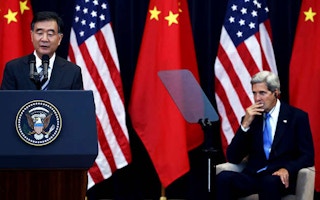China and the U.S., which together burn more than 40 percent of the world’s coal, have agreed to jointly develop technology to capture carbon dioxide from power plants and take other steps to combat climate change.
The agreement came during the U.S.-China Strategic and Economic Dialogue that started today in Washington. Talks are hosted by Treasury Secretary Jacob J. Lew and Secretary of State John Kerry and include counterparts Vice Premier Wang Yang and State Councilor Yang Jiechi.
The two nations will implement “large-scale, integrated” demonstration projects aimed at capturing, utilizing or storing carbon dioxide, according to a statement released by the U.S. State Department. “These demonstrations will engage companies in both countries and allow for enhanced trade and commerce.”
The countries will also work together to lower emissions from heavy-duty vehicles, increase energy efficiency in buildings and improve greenhouse gas data collection, according to the statement. Implementation plans for those targets will be ready by October, according to the statement.
Important players
“There is no question that China and United States together are the two most important players,” U.S. Special Envoy for Climate Change Todd Stern told reporters by telephone after meeting with the Chinese today. “So anytime the U.S. and China cooperate and find a means of cooperating and acting together, I think it has a very positive overall impact” on international negotiations.
President Barack Obama made curtailing carbon-dioxide emissions from power plants the centerpiece of a plan he unveiled June 25 to address global warming. China is the world’s biggest emitter of greenhouse gases that are linked to climate change.
“Ambitious domestic and cooperative action by China and the United States is more critical than ever,” the State Department said in the statement. “The United States and China recognize that there is significant scope for reducing emissions and reducing costs through comprehensive efforts to improve energy efficiency.”
Germany’s Environment Minister Peter Altmaier said last month that renewed momentum for climate protection in U.S. and China means that world leaders have a chance to “reach a breakthrough with regard to a binding global deal” at the United Nations climate summit in Paris in 2015. Those talks are aimed at adopting a global treaty that would limit fossil fuel emissions starting 2020.










